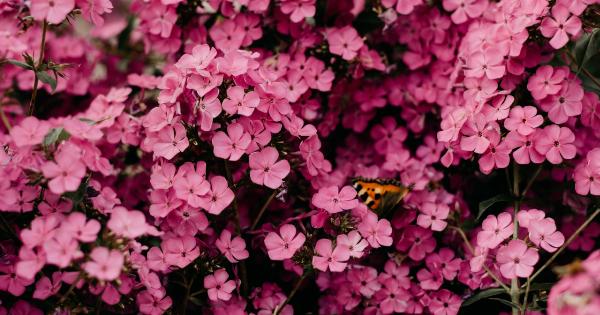In the eternal quest for beauty and youth, humans have explored various avenues. From cosmetics to medical procedures, people are constantly searching for ways to turn back the clock and preserve their youthful appearance.
However, one area that is often overlooked is the power of nature, specifically flowers, in fighting the signs of aging. This article will delve into the science behind how flowers can help combat the effects of aging and reveal the secrets behind their rejuvenating properties.
The Chemistry of Beauty
Flowers, with their vibrant colors and fragrant scents, have an innate ability to captivate our senses. However, their beauty goes beyond what meets the eye. Flowers possess a complex chemistry that enables them to thrive and bloom.
It is this chemistry that also holds the key to their anti-aging properties.
Phytochemicals: Nature’s Anti-Aging Agents
Phytochemicals, also known as plant chemicals or secondary metabolites, are naturally occurring compounds found in various parts of plants. These compounds are responsible for the color, scent, and taste of flowers.
Furthermore, they play a crucial role in a flower’s defense mechanism against environmental stressors, such as UV radiation and pathogens.
When it comes to anti-aging, phytochemicals offer an array of benefits. They exhibit antioxidant, anti-inflammatory, and photoprotective properties that can help combat the effects of aging on the skin.
By neutralizing harmful free radicals, phytochemicals protect cells from oxidative damage, thus preventing premature aging.
Floral Superstars: Roses and Their Anti-Aging Powers
Among the vast variety of flowers, roses stand out as potent anti-aging superstars. Roses contain various phytochemicals, such as anthocyanins, flavonols, and tannins, which contribute to their rejuvenating effects.
Anthocyanins, responsible for the vibrant red color of roses, possess powerful antioxidant properties. They scavenge free radicals, reduce inflammation, and enhance collagen synthesis, promoting firm and youthful skin.
Flavonols, on the other hand, strengthen the skin’s barrier function and protect against UV-induced damage. Tannins found in roses have astringent properties that can help tighten and tone the skin.
Unveiling the Power of Orchids
Orchids, known for their elegance and beauty, also harbor impressive anti-aging abilities. These flowers contain unique compounds called orchidaceae acetogenins, which have been found to have significant antioxidant and anti-inflammatory effects.
Orchidaceae acetogenins combat aging by neutralizing free radicals, reducing oxidative stress, and protecting against UV damage.
They also inhibit the activity of enzymes, such as collagenase and elastase, which are responsible for the breakdown of collagen and elastin, leading to sagging and wrinkling of the skin. By preserving the structural integrity of these skin proteins, orchids help maintain a youthful appearance.
Lavender: A Multi-Talented Anti-Aging Flower
Lavender, beloved for its calming scent, possesses a wide range of therapeutic properties. When it comes to anti-aging, lavender also proves to be a formidable ally.
This flower contains potent phytochemicals, including linalool and linalyl acetate, which contribute to its anti-aging prowess.
Lavender’s anti-inflammatory properties help soothe and calm irritated skin, reducing redness and inflammation associated with aging.
Its antioxidant activity combats free radicals, while its collagen-stimulating effects promote firmness and elasticity. Additionally, lavender’s scent has been found to have mood-enhancing properties, helping combat stress, a known contributor to premature aging.
Nature’s Pharmacy: Camellia Sinensis (Tea Plant)
While flowers often steal the spotlight in the beauty world, the leaves derived from these plants should not be overlooked. The camellia sinensis plant, specifically its leaves, is the source of various teas, including green, black, and white tea.
These teas have been enjoyed for centuries due to their numerous health benefits, including their anti-aging effects.
Camellia sinensis leaves are rich in polyphenols, particularly catechins. These polyphenols possess potent antioxidant and anti-inflammatory properties that protect the skin from oxidative stress and reduce inflammation.
Additionally, green tea has been found to enhance collagen synthesis and inhibit enzymes that degrade collagen and elastin, thus promoting youthful skin.
Harnessing the Power of Flowers in Skincare
Thanks to scientific advancements, the benefits of flowers can now be harnessed and incorporated into skincare products. Flower extracts, essential oils, and floral waters are popular ingredients in various beauty formulations.
These products offer the advantages of phytochemicals in concentrated and targeted forms.
Whether in the form of creams, serums, or masks, flower-infused skincare products can aid in reducing wrinkles, improving skin elasticity, and enhancing radiance.
However, it is important to choose products with high-quality ingredients and appropriate concentrations to fully experience the anti-aging benefits of flowers.
A Blooming Future: The Potential of Flower-Based Research
While the anti-aging properties of flowers are already being utilized in the beauty industry, ongoing research continues to unveil new and exciting discoveries.
Scientists are exploring novel applications of flower-derived compounds, seeking ways to optimize their efficacy and develop innovative anti-aging treatments.
Recent studies have identified unique compounds in flowers, such as peonies and marigolds, with promising anti-aging potential.
Additionally, advancements in extraction techniques allow scientists to extract and concentrate specific phytochemicals from flowers, maximizing their benefits.
Conclusion
Nature has provided us with an abundance of beauty and resources, including flowers that possess remarkable anti-aging properties.
The science behind their rejuvenating abilities lies in the rich chemistry of phytochemicals, which offer antioxidant, anti-inflammatory, and photoprotective benefits.
From roses and orchids to lavender and tea leaves, flowers have proven to be powerful allies in the quest for eternal youth.
As research continues to unfold the secrets hidden within these blooms, the integration of flower-derived compounds in skincare products will likely continue to grow.






























